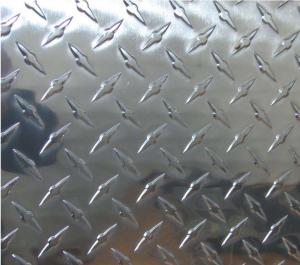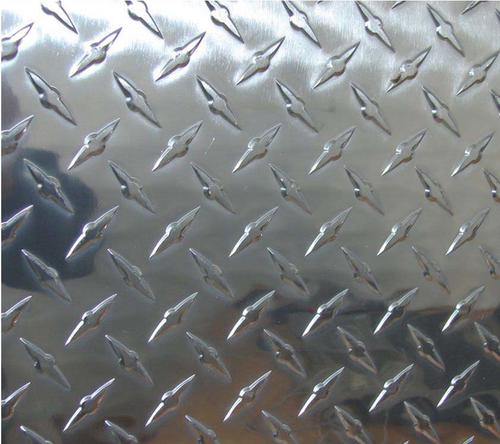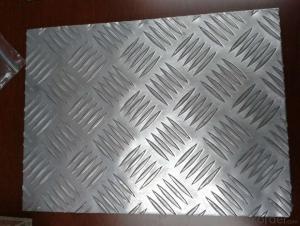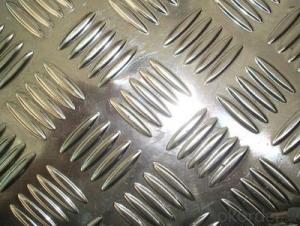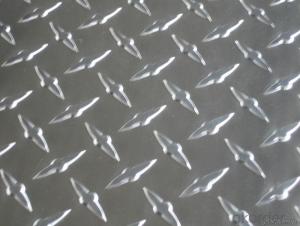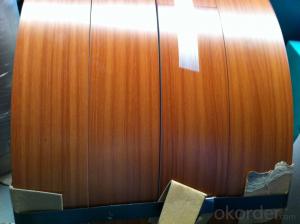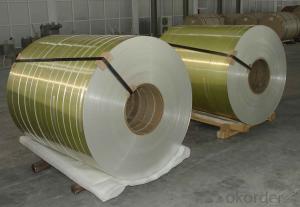Carrier Aluminum Coils Diamond Aluminium Sheet
- Loading Port:
- China Main Port
- Payment Terms:
- TT OR LC
- Min Order Qty:
- -
- Supply Capability:
- -
OKorder Service Pledge
Quality Product, Order Online Tracking, Timely Delivery
OKorder Financial Service
Credit Rating, Credit Services, Credit Purchasing
You Might Also Like
Specifications
Aluminium Checkered Sheet
Alloy: 1000 series,3000series,5000series,6000series.
Thickness:0.8mm-10mm.
Width:900mm-1600mm.
| ITEM | ALLOY | PATTERN | THICKNESS | WIDTH | APPLICATION |
ALUMINIUM CHECKERED PLATE | 1000SERIES 3000SERIES 5000SERIES 6000SERIES | DIAMOND 2 BARS 3 BARS 5 BARS | 0.8MM-10MM | 900MM-1600MM | Lighting,construction,printing,packing,decorative,electronics surface... |
Technical Specifications
Thickness: 0.8-10mm
Width: 900-1600mm
Length: 800-8000mm
Material (alloy): 1100, 1050, 3003, 3103, 5052, 5754, 5083, 6061, 6082
- Q: What are the potential environmental impacts of aluminum coil production?
- The potential environmental impacts of aluminum coil production include deforestation due to the extraction of bauxite, water pollution from the chemicals used in the refining process, air pollution from the release of greenhouse gases during smelting, and energy consumption, as aluminum production requires a significant amount of electricity. Additionally, the disposal of waste materials and by-products can contribute to soil contamination if not managed properly.
- Q: Is it safe or practical to use an electric iron as a heat source for an aluminum coil?
- <p>Using an electric iron to heat an aluminum coil is not advisable. Electric irons are designed to heat their own plates for ironing clothes, not to transfer heat to other materials like aluminum coils. The high temperature of an iron could damage the coil and potentially cause a fire hazard. Moreover, aluminum has a high thermal conductivity, which means it would dissipate heat quickly, making it inefficient to use an iron for this purpose. Always use heating elements specifically designed for the material you intend to heat.</p>
- Q: Are aluminum coils suitable for insulation jacketing?
- Indeed, insulation jacketing can be effectively achieved with aluminum coils. Renowned for their exceptional thermal properties, durability, and resistance to corrosion, aluminum coils are a highly favored choice for jacketing material. They find extensive application across diverse industries such as HVAC, oil and gas, and petrochemical, where they serve to insulate pipe systems and equipment. By enveloping insulation materials, aluminum coils play a crucial role in safeguarding against moisture infiltration and sustaining thermal efficiency. Moreover, their lightweight composition ensures effortless installation and transportation. Ultimately, aluminum coils emerge as a dependable and efficient solution for insulation jacketing endeavors.
- Q: ok-so lately I've noticed that everytime i wrap food in aluminum foil it starts to eat tiny holes in it! so far it has happened when I put it on chicken breasts and froze them--over a warm eggplant parm that i put in the fridge and now, today on coleslaw--which was never hot! what the heck is going on? I've never seen this before! any ideas? it is a name brand foil too...tx!
- I have noticed that myself and thought it was just the new method of making the foil? or something I was putting on the foods I wrapped? well, I started using the cling wrap then the foil to seal it in and haven't had so much problem with the foil having those tiny holes in it that make the wrap not so air tight and the food doesn't get freezer burned any more either.
- Q: My budgies took at bath in an aluminum pie tin today. At first they bit it just because it was their first time. Should I be worried that they might get poisoned?
- Nah, when I was a baby I took baths in aluminum pie tins all the time.
- Q: This question asks for methods to protect aluminum coils from damage during storage and transportation.
- <p>To prevent damage to your aluminum coil during storage or transportation, follow these guidelines: Store the coils in a dry and clean environment to prevent moisture and dirt accumulation. Ensure that the storage area is well-ventilated to avoid condensation. Use appropriate padding or separators between coils to prevent scratching or denting. Handle the coils with care, using proper lifting equipment to avoid dropping or mishandling. Secure the coils during transportation to prevent movement that could lead to damage. Keep the coils away from corrosive substances and extreme temperatures. Regularly inspect the coils for any signs of damage and address any issues promptly.</p>
- Q: How are aluminum coils priced in the market?
- Aluminum coils are typically priced in the market based on factors such as the current market demand and supply, the cost of raw materials, production and manufacturing costs, transportation costs, and any additional factors that may affect the overall pricing.
- Q: This question asks for a comparison between aluminum coils and other metal coils, highlighting their distinct characteristics.
- <p>Aluminum coil is distinct from other metal coils due to its lightweight, high corrosion resistance, and excellent thermal and electrical conductivity. Compared to steel coils, aluminum coils are softer and more ductile, making them easier to bend and shape without breaking. They are also non-magnetic and have a lower melting point. Copper coils, on the other hand, have superior electrical conductivity but are heavier and more expensive. Zinc coils offer good corrosion resistance but are less ductile and have lower strength. Each metal coil has specific properties that make them suitable for different applications, such as construction, electrical wiring, or automotive parts.</p>
- Q: What are cold rolled aluminum coils and hot rolled aluminium coils, what are their respective features?
- The difference between hot rolling and cold rolling is that cold rolling is rolled at recrystallization temperature and hot rolling is above the recrystallization temperature.
- Q: This question asks for the distinctions between a single-layer aluminum coil and a multilayer aluminum coil, focusing on their structure and potential applications.
- <p>A single-layer aluminum coil consists of a single sheet of aluminum wound into a roll, while a multilayer aluminum coil is made up of multiple sheets of aluminum stacked and wound together. Single-layer coils are simpler in structure and are often used for applications requiring less complexity, such as basic insulation or simple wrapping. Multilayer coils, on the other hand, offer increased strength and can provide better insulation properties due to the multiple layers. They are also used in applications where space is limited, as they can be more compact. Additionally, multilayer coils can be tailored for specific heat transfer or electrical conductivity needs by varying the thickness and composition of the layers.</p>
Send your message to us
Carrier Aluminum Coils Diamond Aluminium Sheet
- Loading Port:
- China Main Port
- Payment Terms:
- TT OR LC
- Min Order Qty:
- -
- Supply Capability:
- -
OKorder Service Pledge
Quality Product, Order Online Tracking, Timely Delivery
OKorder Financial Service
Credit Rating, Credit Services, Credit Purchasing
Similar products
Hot products
Hot Searches
Related keywords
